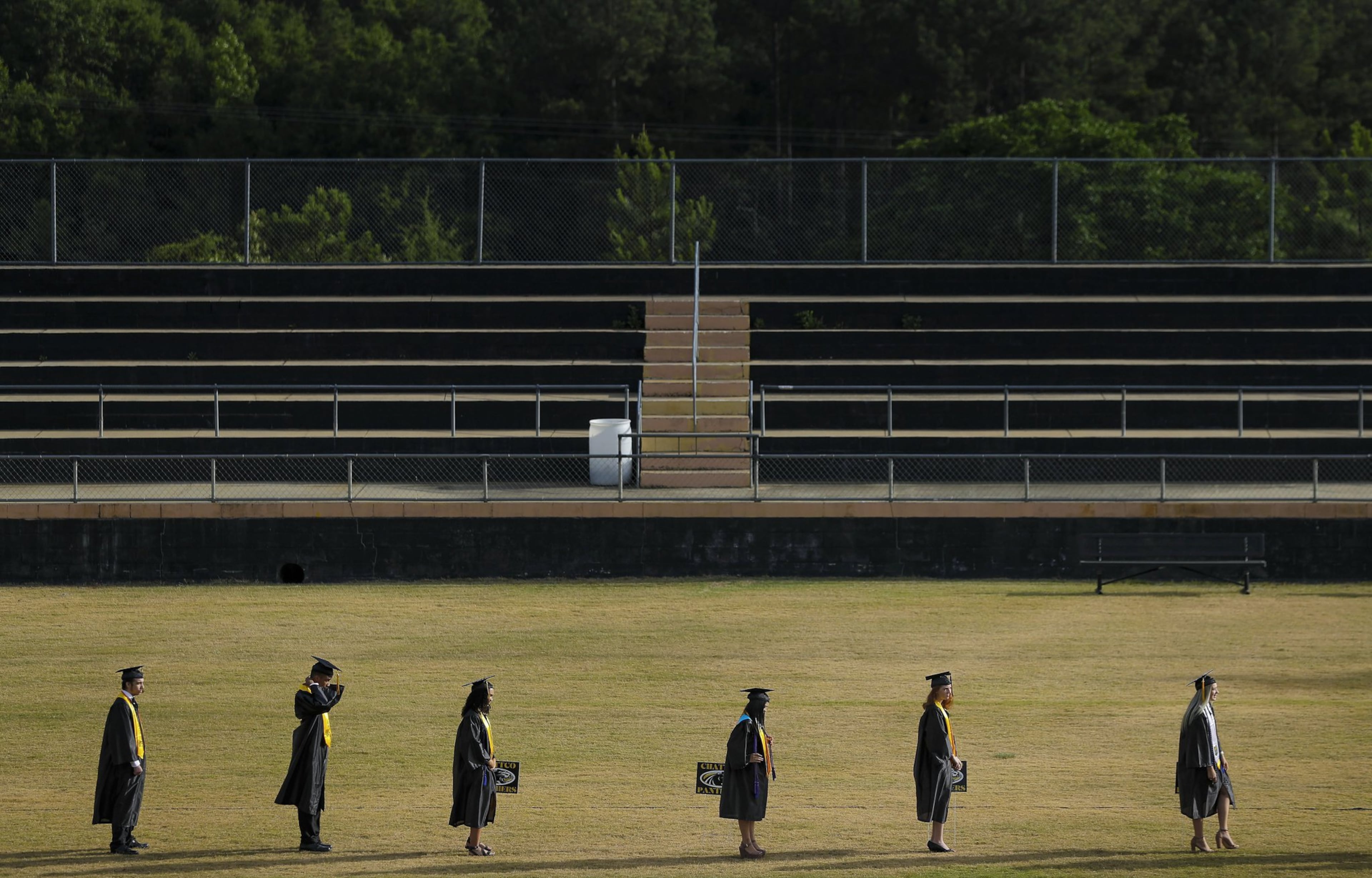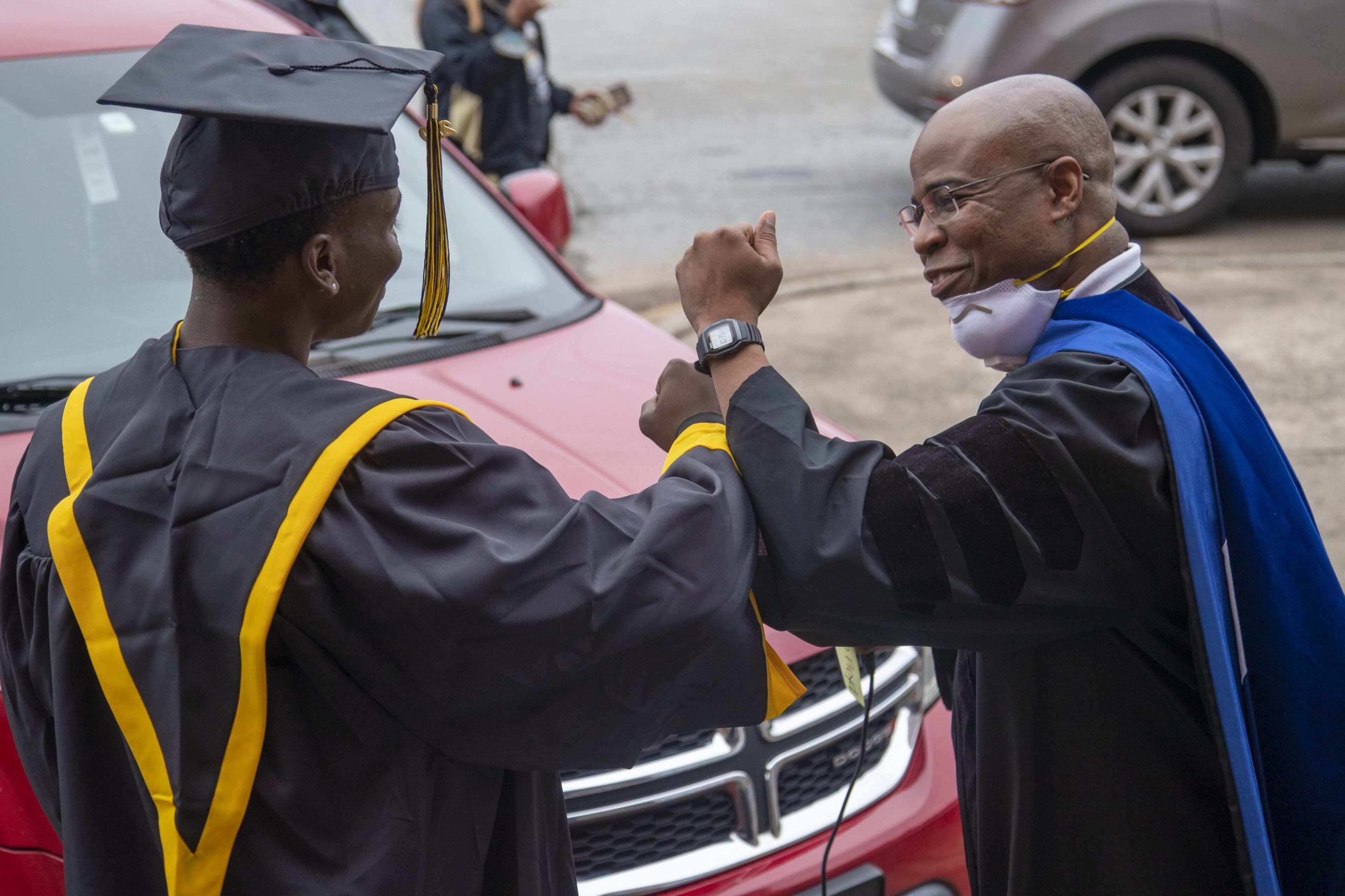A crystal ball for fall: How can K-12 schools cope?

Schools across Georgia are ending for summer after the most trying semester in memory, but in about two months, they must do it all over again.
Operating completely online after forced school closures was difficult, but teachers predict it would be even harder to do that in the fall. Top of mind for many: They won’t know their students. The relationships they forged last fall helped with the move to “remote” schooling, when electronic messages, one-way videos, phone calls and the occasional video conference replaced face-to-face conversations. Another issue: Students will actually have to learn new material.
The emotional toll from months of lockdown and isolation from friends is immeasurable, but at least the retreat from classrooms forced by the coronavirus came after most schools had already wrapped up their curriculum for the year. Many were turning to review ahead of statewide tests.
In August, though, teachers will be starting their students on all new curriculum. Even school districts that have been honing their online game for weather outages are seeing the limits of school on a screen.

Teachers in Forsyth County, a north metro Atlanta district known for its technical prowess, can power through a snowstorm closure. By mid-March, when schools closed, they and their students had been well-drilled on using the online platforms. But they were used to home schooling a couple of days rather than a couple of months, said Amber Lee, who has been helping teachers adapt to their new role.
“We literally asked teachers to change 100 percent of what they teach in two days,” said Lee, an instructional coach at Haw Creek Elementary School. She worries students will fall behind next fall if classrooms don’t reopen and teachers cannot return to what they do best: live, in-person performance.
READ | Georgia begins planning for school in the fall
Teachers say it’s hard to read body language and facial expressions through a computer, let alone build relationships. They also worry about kids who rely on schools for meals and who, after getting to know a teacher, may lean on them for help with difficult situations at home. Many of them fear both academic and mental health harm from extended isolation.
That is why state education leaders and some school superintendents are talking about a return to classrooms as summer ends, even though no one expects a vaccine for COVID-19 by then.

It will be a complicated and delicate undertaking that could invite a backlash. School leaders surely noticed what happened in Gwinnett County recently, where the district ordered teachers back to their classrooms to wrap things up for the year, inciting an insurrection online. District officials ultimately relented, and the teachers stayed home.
Georgia education leaders are mulling their few options. Fulton County Schools, for instance, has proposed three scenarios: returning to classrooms as normal (unlikely); using computers at home for more remote learning (undesirable); and a hybrid of those two, a seemingly ascendant idea similar to what is already happening abroad.
>> RELATED | Metro schools considering smaller class sizes in COVID-19 fight
Sydney, Hong Kong and Japan are alternating attendance so all students are not present at the same time, according to news reports. Germany halved class sizes, made hallways one-way and required that windows and doors be open despite the chilly weather. Denmark moved a lot of classes outdoors.
“I’m hearing more and more where there are conversations around starting with a hybrid,” said Stephen Pruitt, president of the Atlanta-based Southern Regional Education Board.
His organization advises leaders in Georgia and 15 other states, and has been meeting with them for about a month on this. No one expects a return to normal, he said.
States across the South are working with concepts first proposed by the Georgia Department of Education, Pruitt said. In early June, the agency will roll out its formal guidelines for the state’s 180 school districts. The guidance will recommend the range of options already under consideration by Fulton and some other districts, with the degree of in-person schooling tied to local public health conditions, said Matt Jones, chief of staff for agency leader Richard Woods, the state school superintendent. Each district will ultimately make its own decision about what to do in the fall, unless Gov. Brian Kemp issues a mandate.
The guidance is still under review, but here are the outlines of some of the hybrid options: put students on half day or every other day schedules, or fill most buildings with younger students, leaving older students at home and online. That latter option acknowledges that younger students have a harder time learning online, but it also forces high school and maybe middle school students to rely on internet service that is not universally available.
It is unclear how extensive the internet access problem is in Georgia, but some teachers said half their students didn’t show for classes when school went online in March.

Kemp’s office is focused on the problem, Jones said. “I think more people are on board that it is a necessity rather than a luxury. … To me, it’s on par with access to water and electricity.”
The hybrid options free some or all students from full-time reliance on the internet, but they come with their own logistical issues, Jones said.
If all students go part time, then young children would be at home sometimes, so what about households where the parents leave for work and rely on their teenagers to watch their younger siblings? The teens could not go to school unless their schedules coordinated with their younger brothers and sisters. What if that parent is a teacher in another school district with a different schedule? What if a significant number of teachers are in a high-risk group and cannot safely return to the classroom?
A survey in late March by the Professional Association of Georgia Educators that garnered more than 15,000 respondents reported that half said they, or a family member, were in a high-risk group.

“To me, that would be a nightmare for scheduling,” said Windy Cox, a high school social studies teacher in South Georgia. Like most of the teachers interviewed, she aches to return to her classroom and worries about how the Early County High School students are faring in a community where many parents must leave home for work and many households lack internet service, or food.
Many there, regardless of income, get by with only the connection on their phones, but even that is unreliable. One of Cox’s colleagues, a middle school teacher, routinely drives 10 miles to a library parking lot to access the free Wi-Fi because the data connections on her phone and on her husband’s (also a teacher) inexplicably stop working after 11 a.m. Everyone in that family — their two kids are in elementary school — must get their work done by then on those two phones.
RELATED | Governor sending roving internet service to some rural students
The availability of cellular service “depends on where you’re standing,” Cox said, noting that the Zoom videoconferencing platform stuttered and froze when she met with the handful of her students who could get onto it.
“We’d never be able to teach all of them online,” she said. Wobbly technology is far from her only motive for a return to the classroom. “I don’t want to sound like I’m not concerned for safety when we go back in the fall,” Cox said. “I just miss my kids. I miss teaching.”
Beyond the scheduling issues of going back to school are myriad safety concerns.

The youngest students are most in need of a teacher’s presence yet are also the most unlikely to adhere to safety protocols.
Denice Dudley, mother of a rising kindergartner in Dunwoody, can imagine how children will be unable to resist touching each other’s masks.
“Oh, you’ve got a pink one, or oh, you’ve got Spider-Man,” she said, anticipating their behavior.
Both her daughters, the younger one is 2, were outside playing in the sprinkler when she spoke over the phone on a recent afternoon. She still wants school to open. She and her husband have demanding jobs, neither is great at home schooling and they’ve consequently had to occupy their daughters with way more television than she cares to admit. She is just not sure it will happen.
“I don’t know how you’re going to expect social distancing. I just think that’s unrealistic,” she said. “I think that sounds like a nightmare to administer.”
That word for night terrors was invoked by teachers, too.
Would a school have to close every time an infection is reported? What if a student or teacher isn’t infected but someone living with that person is? How much will it cost to constantly close, reopen and disinfect the buildings?
“It will be just a financial nightmare,” predicted Shawn Newton, who teaches math at Fulton County’s Haynes Bridge Middle School. She said both she and her husband are at high-risk for serious complications from infection with the virus, and she would be reluctant to return to teaching in person until there is a vaccine.

“You want to go back because you want to build those relationships with students,” she said. “But there are some real cons to going back, like hallways, lunchrooms. How do you get the kids to wear masks? That’s going to be a nightmare.”
Lee, the instructional coach in Forsyth, said teachers are combing through the curriculum for what is most essential, so they can review those parts in the fall. She hopes to return to her school, but admits she is nervous about it. Her mother has an autoimmune disorder and her grandmother is 94, and she knows she won’t be able to visit them even though they live nearby.
“If I did contract the virus I feel like I would be OK,” she said, “but I have people around me who wouldn’t be OK.”



